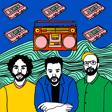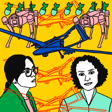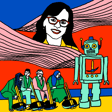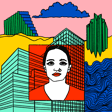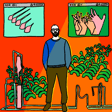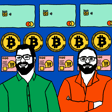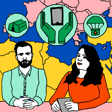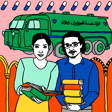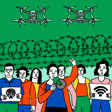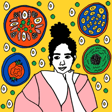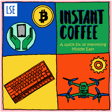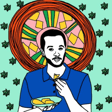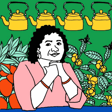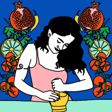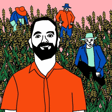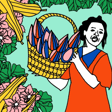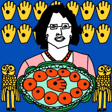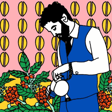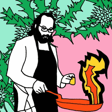Introduction to New Season on Regional Technology
00:00:03
Speaker
Welcome to Season 3 of Instant Coffee. I'm Nadine Almanasvi. And I'm Sima Shehab.
Exploration of Technology: Historical and Modern
00:00:08
Speaker
And this latest season is an exploration of technology and its development in the region. Beyond the emergence of Czech GPT and Sofia the Robot, we wanted to speak with people who are applying, adapting and reimagining technology in their fields. We will be exposed to medieval Islamic hospitals, failed Gulf techno cities, emerging Iraqi fintech startups, inclusive artificial intelligence and much more.
Advancements in Mapping and Archiving Technologies
00:00:32
Speaker
And this episode is all about maps and archiving technologies. I think those of us working in and around academia and also those keeping an eye on creative cultural practices in the region have known as an increased effort to digitize and archive historical moments. There are a lot of exciting archiving initiatives emerging that are led from people in the region and in the diaspora. Some of these projects have started as a result of the Arab Spring and others are concerned with more historical documentation.
00:00:59
Speaker
We spoke with the co-founders of two of these projects, Sanne Yazizi of the Creative Memory of the Syrian Revolution and Majd Ashihabi of Palestine Open Maps. In our conversations with Sanne and Majd, we discussed how the digital sphere and new technological tools have enabled them to document and archive their respective histories and the role the map plays in these endeavors. We asked Sanne and Majd to tell us a bit more about their respective projects and the way they have used mapping technology.
Palestine Open Maps: Project Insights and Mapathons
00:01:27
Speaker
Hi, my name is Majd Eshihabi. I'm a technologist, urban planner, and a PhD student at the University of Toronto in the Geography and Planning Department. My project in collaboration with Ahmed Barkley and Visualizing Palestine is called Palestine Open Maps, and it's a project that I've been working on with Ahmed since 2018. It's a series of maps that were made by the British colonial authorities in the
00:01:52
Speaker
30s and 40s. There's about 155 of them that we compiled and created a massive slippy map that you can navigate online and we've augmented it with other layers of geographic data so we complemented it with another set of maps from the Palestine Exploration Fund from the 1870s and with other modern data so you have from OpenStreetMap you have a layer of
00:02:16
Speaker
road networks of what is there today, and we've also augmented it with a layer of Palestinian villages that are destroyed, depopulated, built over during the Nakba. The layering of these maps creates a really interesting way of viewing the history of Palestine, which is a very layered history as well, so we're trying to play on that metaphor. What kind of new insights are being produced through this layering process do you think?
00:02:43
Speaker
Palestine is one of the most studied places on earth geographically. Every centimeter of that land is contested, right? What we try to do with Palestine Open Maps is to see all of this data that has been collected about Palestine to contrast it with the historical data.
00:02:59
Speaker
what we try to do is to engage the public in comparing the past and the present of Palestine through the viewing of the maps. But one of the most important things about this project is a series of workshops that we've been running. I got support to start running this project from
00:03:19
Speaker
the Basel Khartoubil Free Culture Fellowship. Basel Khartoubil was a Palestinian-Syrian free culture activist who was killed in Syrian regime prisons for his free culture activism, basically. When his community, and I was a part of that extended community, learned about his death
00:03:35
Speaker
organizations that he was involved in, worked together to create this commemorative fellowship in his name. And this were like Creative Commons Foundation, Mozilla Foundation, Wikimedia Foundation, and a few other smaller contributors. And that supported this work of doing mapathons. And these mapathons are a big part of what you do, right? Can you talk us through the process exactly and how it contributes to Palestine Open Maps?
00:04:03
Speaker
Mapathons are workshops where I get 20, 30, 40, however many people are willing to participate. I get them to join me in extracting data out of the historical maps. The maps, as you see them, if you go to palsteinopenmaps.org or palopenmaps.org,
00:04:20
Speaker
These are just paper maps that we've like they have been digitized by taking a photo of the map so it's it's just pixels that the computer doesn't know how to read. What the mapathons do is that people go in and create digital artifacts
00:04:36
Speaker
that then are understood by the computer. So instead of having like a printed on paper, the name of a village or a name of a specific plot of land next to a village, you have an XY or latitude-longitude coordinate with the Latinized name and the Arabic original Arabic name.
00:04:58
Speaker
And what this allows us to do is to allow, for example, a full-text search of not just the village names and the town names, but of the smallest details of the entire map, whether it's a name of a specific quela, a name of a specific wadi or a waterway, a name of a specific parcel of land.
00:05:20
Speaker
and so on. But also, not just that, what we have is, for example, the road network. And a lot of that road network has been destroyed because the villages that the road networks lead to were destroyed. 500 villages and towns were depopulated during the Nakba, so we're trying to have a historic document of the road network as it stood before the Nakba. And what kind of people are taking part in the mapathons? Are they mostly Palestinians?
00:05:48
Speaker
The mapathons, the way I've structured them is that I invite 20, 30, 40 people to come in. I always do them in collaboration with a community organization and I've done them in a lot of different places in a very wide range of types of places. So I've done them in refugee camps in Lebanon and I've done them at the British Library and that's like Cambridge University and everywhere in between.
00:06:12
Speaker
Each one of those map-a-thons attracts a different type of person. It could be like the descendants of Palestine refugees who are technically still Palestine refugees themselves, or they could be map nerds who like to go to map events at the British Library. Interesting. And what are the benefits of having this wide range of people involved in the mapping process? Does it still retain its accuracy if so many people are involved and
00:06:39
Speaker
Do you think it might be better to have this automatically done through some kind of software? So there is a movement around the world right now, which is called the GLAM movement, G-L-A-M, so galleries, libraries, archives and museums. And within the GLAM movement, there is a movement to do this automatically because it's going to take centuries for us to extract all of the data from
00:07:04
Speaker
from archives. There is a movement to automate this process, especially at the British Library. I know they've been doing a lot of this stuff. And there is also a very active group of researchers who are trying to extract data out of historical maps as well.
00:07:20
Speaker
What the microphones do is do the same process, but actually do it manually. And there is a specific reason for that. The manual process of extracting data involves people looking at the maps in a very close way and understanding what the maps say in a way that's not the same way that was intended by the map makers.
00:07:41
Speaker
The map makers didn't have Palestinians post-Mekba remembering their villages as one of their goals. This has a lot of dimension. It also has parallels, for example, with an old debate that happens in the OpenStreetMap community, which is between the craft mappers they call themselves and
00:08:02
Speaker
The people who want to do bulk imports of data from Facebook keeps donating these massive data sets and Microsoft keeps donating massive data sets of building footprints all over the world that they extract using AI and machine learning algorithms. And a lot of people in the OpenStreetMap community say, no, this is a craft process and
OpenStreetMap and Data Integration for Heritage
00:08:24
Speaker
People from that village should be built mapping their old buildings, not someone who's living in Los Alamos in the US and running a machine learning algorithm on their massive data center. There's a parallel between that discourse and
00:08:41
Speaker
what we're doing in the mapathons we're saying no we want active participation of the subject of the map to kind of restore or re-indigenise the map and give it back to its people. And can you talk to us about what it would even look like to build this system of maps?
00:09:01
Speaker
They go in and they start building, like, re-drawing all of the map polygon by polygon, point by point, line by line, using the open source infrastructure that was created by the OpenStreetMap community. So what I've done actually is take the entire infrastructure of OpenStreetMap, deployed it on a private server,
00:09:22
Speaker
managed gets a bit technical here, but it helps us to understand how he's repurposed pre-existing open source material, bringing to light forgotten and erased histories of Palestine. We mix our historical data with the modern contemporary data of OpenStreetMap. It's a separate database, but the open source tools that were developed for extracting geographic data from aerial or satellite imagery on OpenStreetMap, we apply that for historical maps.
00:09:48
Speaker
Within this process, I get someone who is a 15-year-old Palestinian Syrian, who became a Palestinian Syrian refugee in Lebanon, who sees their village for the first time. They've always heard about their village but have never seen it with their eyes. They see it only as a map, but they see it. At least they know how to
Creative Approaches to Archiving at LSE
00:10:10
Speaker
place it on the map. They see what roads lead to it. They see how it is placed within a geographic continuity.
00:10:19
Speaker
Marist's emphasis on community and people-centered mapmaking is not necessarily traditional or conventional. Before we hear from Sana, we invited Sara, Salim, and Maiktaha of LSE who are actively engaging in alternative archiving practices, particularly creative ones. We were curious to know why this approach is so important and what it brings to the discussion and theory of archiving and mapmaking.
00:10:42
Speaker
My name is Maia Doha and I'm an assistant professor in the Department of Sociology at the LSE. My work is generally on labor and social reproduction. I'm working also on revolutionary subjectivity.
00:10:56
Speaker
I am Sara Selim. I am an associate professor in the Department of Sociology at LSE and I work mostly on histories of anti-colonialism and especially now on how we might archive these histories and remember them and the role of memory in contemporary politics.
00:11:17
Speaker
So our project that we began last year, Archive Stories, is a website about how to work with creative and non-traditional archives. We wanted to create a space for conversations about archiving beyond institutional archives to think through the possibilities that open up when we imagine the archive as something expansive and encompassing everything around us.
00:11:42
Speaker
We designed this website with Frederick Canemare to reflect the idea of archiving as a creative practice. So it's an open access website that's accessible beyond academic spaces. And it's designed in a way that allows you to make your way through without a set path.
00:12:01
Speaker
So far the website includes a collection of 23 archive stories and we are hoping to add more each year. And we imagine this website basically as a starting point for anyone interested in exploring
Creative Memory Project: Syrian Revolution Art
00:12:16
Speaker
more creative and non-traditional archives.
00:12:19
Speaker
The focus of these archive stories is not on the archives themselves, but actually on the archiving as a creative practice. So for example, we ask things like, what does it mean to work with creative archives like music or food or film? How does someone begin working with archives like these?
00:12:41
Speaker
We also think that these archive stories are becoming increasingly important in light of the difficulties around institutional or traditional archives. So national state archives, though important, raise a whole host of concerns.
00:12:57
Speaker
In some places, they have been and continue to be destroyed as part of violent political processes. In other places, people are denied access to them because of authoritarianism or oppression or because they have not been taken care of. Similarly, the colonial archive raises the same kinds of concerns. They represent colonial power.
00:13:20
Speaker
and are organized in ways that replicate that power. So we see this in the way they are organized and curated as well as in the history of how the archival objects were collected to begin with. So we can certainly read institutional archives against the grain, but we think that there are a whole array of other archives that have much to tell us about history.
00:13:45
Speaker
Creative practice is a fundamental part of the creative memory of the Syrian revolution led by Sana Yazizhi. We spoke to her about this collective effort to document the artistic output from the Syrian revolution and what this living Internet archive has done for its creators and contributors. Okay, so let's go ahead. Yes, please. Okay, so I'm Sana Yazizhi.
00:14:08
Speaker
I'm Syrian, I'm a graphic designer. I've been working for freelance graphic designers for years and 10 years ago I founded Creative Memory of the Syrian Revolution. It's about archiving and documenting creativity that took place during the revolution and the Syrian war until today. And what were your motivations behind starting this project?
Internet's Role in Documenting the Syrian Revolution
00:14:36
Speaker
to think about creative memory when I was in the revolution and to completely involve. I was just asking myself about this creative initiative that was taking place. I was asking myself, who is collecting this? Who is conserving this? But I wasn't in the mood of doing anything rather than involving with the revolution. The work on creative memory took place when I was outside Syria, when I was in total
00:15:06
Speaker
how to say sadness and feel like I was guilty to leave people behind me and to save myself and go out Syria to Lebanon. So it came from this moment of pain. And what I started to do is a simple block inside which I started to collect what I started to find on the internet. But I was astonished at that moment of the quantity and that diversity
00:15:35
Speaker
of creativity that was taking place. Creative memory came also as a political answer, because in early steps during the revolution, the regime narrative was saying, why only Dara this is in the south? Why only Homs this is in the middle? This narrative was spreading and we had foreigners, journalists coming to us asking us the same question of the regime.
00:16:05
Speaker
I kept this in mind. And once we created, created memory, and we had like a quantity of archives letting us to create other projects based on those archives, I directly thought about the map and thought about connecting works to their locations. When you have this narrative saying why there are, why humps, you go to the map,
00:16:34
Speaker
You click on the map and you have like 200 points all over Syria. All those 200 locations experience the revolution and the war differently from each other. But this is an evidence, clear evidence, a counter-discout of the regime analytics.
00:16:57
Speaker
The creative memory relied heavily on steady access to the internet. Although it seems like quite basic interpretation of how technology supported their work, for Sanaa, it was fundamental in transforming how her and her colleagues collected and documented the Syrian revolution. So internet, yes, a very, very important material in many domains. And maybe it's useful to remind quickly and say that since the beginning of the Syrian revolution,
00:17:27
Speaker
internet and social media pages, especially Facebook, have been of great importance in communicating between regions, urging people to raise, to strike, and to coordinate as well. It was a very important tool of mobilizing. Reporting was life. Reporting was happening, was life. And this is why we say to only us, but many. Serial revolution and war is by far the only
00:17:57
Speaker
one that was documented that much, every detail, every event, every region. This had a very positive aspect, of course, but it has a negative aspect as well, because this is how the regime could identify people against him. This is why he could follow them, arrest them, or kidnap them.
00:18:22
Speaker
To an extent that at security checkpoints, we were asked to show our ID card, but also our Facebook pages, saying, do you have a face? And a face, you see. Regarding to archives, we observed that beginning of 2012, the virtual domain, internet in our case,
00:18:47
Speaker
has occupied a very important space. It was like a battling space, among other things. Because the public space at that moment and starting that date, the streets turned to be forbidden again due to the brutal repression by the regime and later on by all de facto forces. And what was it like accessing the internet before the revolution?
00:19:17
Speaker
Before the revolution, yes, it was accessible, but it's extremely controlled, extremely controlled. We used to have a weak internet at home, but very good internet in cafes. But this is where a regime can control you. So each time you go to a cafe to open internet and to communicate, you're asked to give your ID, not only to show your ID. And then the one responsible of the cafe, he had access to all computers.
00:19:46
Speaker
so he can see on what websites you are going, what websites you are navigating, and what are you searching exactly. When the Tunisian and Egyptian revolution took place, strangely the regime opened widely the access to internet and to Facebook. So it became very easy for all of us, because even for him it was a double agent.
00:20:14
Speaker
if he forbidden access to internet then he will not know anything if he opens then the coordination between us became very easy so it was it was like an avoidable tool for his for him and for us so technology is it was something that we cannot just avoid we cannot just avoid we have to do with
00:20:37
Speaker
And if we come back to the project, it seems like from what you've said to us, it seems the internet really enabled the map of Syria to expand for people personally. Were you able to connect to people across the country better?
Discovering Syria Through Online Connection
00:20:52
Speaker
Well, let me tell you that all Syrians will tell you this as well. We discovered Syria. Not only we discovered this region or another region, we discovered each other.
00:21:05
Speaker
and we discovered Syria with the revolution. There are places that we didn't know at all, like in Italy, like Serapim, the city of graffiti. We discovered this during the revolution and we were waiting for every graffiti coming out from Serapim.
00:21:25
Speaker
because Saratub and Idlib and for a long period were far from the center, you know, and the regime was totally occupied by controlling Damascus and suburbs of Damascus. So all those far areas from the center had enough time to create and to publish and to connect with other regions.
00:21:49
Speaker
So what I can gather from what you're saying is that the intention was really to create a permanent presence that just isn't available in Syria physically right now. Of course. Of course. It's not only a necessity. You see, we feel it like a vital issue because of this large feeling for us Syrians outside Syria that a country is lost.
00:22:15
Speaker
Sana and Maj's projects have shown the potential and necessity of archiving initiatives, as well as the importance of community-based mapping, archiving and historical documentation. You have now dozens of initiatives, political and non-political initiatives, archiving everything. You have photo archiving, you have ecology archiving, you have poster archiving, you have tempo archiving, you have student archives,
00:22:44
Speaker
This is a political initiative. You have us, creativity archive. And behind this creativity, of course, there's a very political aspect. So this is vital for Syrians. Syrians now are archiving everything as if they are battling this fear of losing everything, as if we are rooting what was unrooted.
00:23:13
Speaker
You see internet, digital, archiving on internet for us is like we are recreating a common space. It's like we are trying to find ourselves, trying to find a common space, trying to imagine another Syria.
Reflections on Mapping Projects and Community Impact
00:23:35
Speaker
I know that this is a very tiny drop in the ocean of everything that's happening in Palestine, and I'm not trying to give this project more credit than it has. But the aim is for everyone who becomes involved, everyone who draws a single polygon, contributes to that dataset is, I hope, slightly
00:23:59
Speaker
more interested in the question of Palestine from the ground up without the symbolism that has been imposed on Palestine since 1948. What I want to assert as a Palestinian scholar is that the process of
00:24:18
Speaker
slowly vectorizing the content of this map does something to also the participants of the mapathons. What they are doing is that they are becoming a part of a community, an epistemic community, that is collaborating on creating and asserting a view of the land from their perspective.
Episode Conclusion and Future Invitations
00:24:43
Speaker
Thank you so much for listening to Instant Coffee, a podcast brought to you by the LSC Middle East Centre. Join us every other Tuesday for a new episode. To learn more about Senna, Majd and their work, follow the link in the podcast description and don't forget to follow us on your favourite streaming platform.

